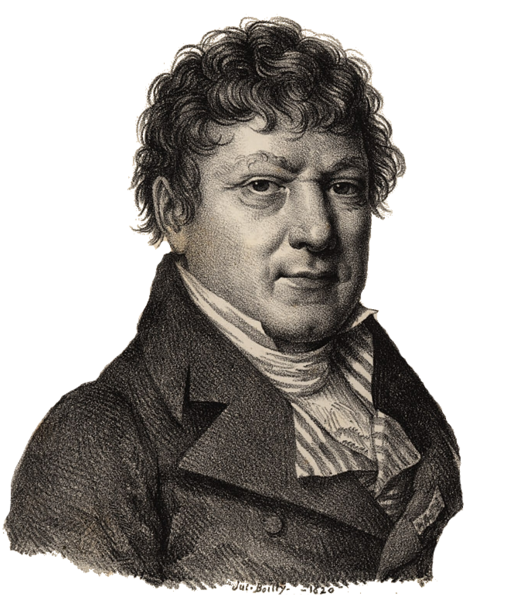<Back to Index>
- Mathematician Jean Baptiste Joseph Delambre, 1749
- Writer David Hartley Coleridge, 1796
- 5th President of the Italian Republic Giuseppe Saragat, 1898
PAGE SPONSOR

Jean Baptiste Joseph, chevalier Delambre (September 19, 1749, Amiens - August 19, 1822, Paris) was a French mathematician and astronomer. He was also director of the Paris Observatory, and author of well known books on the history of astronomy from ancient times to the 18th century.
After a childhood fever, he suffered from very sensitive eyes, and believed that he would soon go blind. For fear of losing his ability to read, he devoured any book available to him and practised his ability to memorise. He thus immersed himself in Greek and Latin literature, acquired the ability to recall verbatim entire pages of books he may have read weeks beforehand, became fluent in Italian, English and German and even published Règles et méthodes faciles pour apprendre la langue anglaise (Easy rules and methods for learning English). In 1788, he was elected a foreign member of the Royal Swedish Academy of Sciences.
In order to establish a universally accepted foundation for the definition of measures, in 1790 the National Constituant Assembly asked the French Academy of Sciences to introduce a new unit of measurement. The academics decided on the metre, defined as 1 / 10,000,000 of the distance from the North Pole to the equator, and prepared to organize an expedition to measure the length of the meridian arc between Dunkirk and Barcelona. This portion of the meridian, which also passes through Paris, was to serve as the basis for the length of the quarter meridian, connecting the North Pole with the Equator. In April 1791, the academy's Metric Commission confided this mission to Jean-Dominique de Cassini, Adrien-Marie Legendre and Pierre Méchain. Cassini was chosen to head the northern expedition but, as a royalist, he refused to serve under the revolutionary government after the arrest of King Louis XVI on his Flight to Varennes. On February 15, 1792, Delambre was elected unanimously a member of the French Academy of Sciences and in May 1792, after Cassini's final refusal, was placed in charge of the northern expedition, measuring the meridian from Dunkirk to Rodez. Pierre Méchain headed the southern expedition, measuring from Barcelona to Rodez. The measurements were finished only in 1798. The gathered data were presented to an international conference of savants in Paris the following year.
In 1801, First Consul Napoléon Bonaparte took the presidency of the Academy of Sciences and appointed Delambre its Permanent Secretary for the Mathematical Sciences, a post he held until his death.
After Méchain's death in 1804, he was appointed director of the Paris Observatory. He was also professor of Astronomy at the Collège de France. The same year he married Elisabeth-Aglaée Leblanc de Pommard, a widow with whom he had lived already for a long time. Her son, Achille-César-Charles de Pommard (1781 - 1807) assisted Delambre on several occasions in his astronomical and geodetical surveys, notably the measuring of the baselines for the meridian survey, and the latitude definition for Paris in December 1799 which was presented to the Conference of Savants.
Delambre was one of the first astronomers to derive astronomical equations from analytical formulas, was the author of Delambre's Analogies and, after the age of 70, also the author of works on the history of astronomy like the Histoire de l'astronomie.
He was a knight (chevalier) of the Order of Saint Michael and of the Légion d'honneur.
Delambre died in 1822 and was interred in the Père Lachaise Cemetery in Paris.
The crater Delambre on the Moon is named after him.